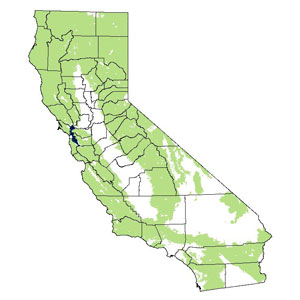

|
Cougar (Puma concolor)
What they look like: Cougars are carnivores (meat eating animals). They are very good at hiding and are rarely seen in the wild. 
Cougars are mammals and the young drink their mother's milk. This animal is identified by its large size, cat-like appearance, uniformly gray to reddish-tan body color, and long tail - nearly three feet (1 m) long and a third of its total length. The muzzle and chest are white and there are black markings on the face, ears and tip of the tail. Cougar kittens have black spots until they are about 6 months old. Adult males weigh up to 200 pounds (about the weight of an adult man), and adult females up to 120 pounds. 
Where they live: Other than humans, cougars are the most widely distributed land mammal in the Western Hemisphere. Cougars range from northwestern Canada to Patagonia, South America. Click on a range map to see where cougars live in Washington and California. Cougars make their dens in rocky ledges, dense thickets and under uprooted trees. They are highly territorial— a male cougar may use a home range of 50 to 150 square miles (for comparison, the City of Seattle is 92 square miles). What they eat: Cougars hunt primarily from dusk till dawn (sunset to sunrise). Their primary prey is deer, but they also eat porcupines, raccoons, birds, small mammals, foxes, mice, and grass. After the cougar is finished feeding on prey, it will cover the carcass (dead animal) with leaves and sticks to save it for another day. 
How they develop: Cougars begin breeding at about 3 years of age. Typical litters have 1 to 6 kittens born after a 3-month pregnancy (people have a 9-month pregnancy). Their eyes open in 8 or 9 days and the young are weaned from the mother in 2 to 3 months. The kittens may remain with the mother into their second year. How long they live: Cougars live about 10 to 20 years in the wild and over 20 years in captivity. NatureMapping - Project CAT (Cougars and Teaching) Project CAT in designed to provide research on cougars in rural and suburban settings to better understand cougar-human interactions. K-12 students, teachers and local community members will assist researchers in this study of regional cougar populations. Learn more >> Did you know?
Animal silhouettes available to purchase » Sources:
Cougars (Mountain Lions) - WDFW Living with Wildlife
Cougars in Mount Rainier National Park
Mountain Lion Tracks and Sign Home | About Us | How to Participate | Biodiversity Modules | Projects | Maps | News | Resources |